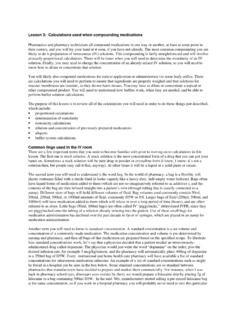Transcription of THE CONFRONTATION CLAUSE AND PRETRIAL …
1 (DO NOT DELETE) 8/30/2010 9:45 AM 1599 THE CONFRONTATION CLAUSE AND PRETRIAL HEARINGS: A DUE PROCESS SOLUTION CHRISTINE HOLST* Despite the recent crop of Supreme Court cases addressing the CONFRONTATION CLAUSE of the Sixth Amendment, many issues regard-ing the application of the CONFRONTATION CLAUSE remain unresolved. In this Note, the author articulates and analyzes one such lingering question: whether the CONFRONTATION CLAUSE applies to PRETRIAL hear-ings, and if so, to what extent. After describing the relevant Supreme Court precedent including the current state of CONFRONTATION CLAUSE jurisprudence the author examines the various ways lower courts have interpreted and applied that precedent in determining whether the CONFRONTATION CLAUSE applies prior to trial.
2 The author then arti-culates three potential approaches to applying the CONFRONTATION CLAUSE to PRETRIAL hearings, yet ultimately concludes that the prefera-ble means of reconciling Supreme Court precedent with the necessity of protecting criminal defendants CONFRONTATION rights prior to trial is to analyze such questions under a due process rather than a Con-frontation CLAUSE framework. I. INTRODUCTION In all criminal prosecutions, the accused shall enjoy the right .. to be confronted with the witnesses against him .. 1 The CONFRONTATION CLAUSE of the Sixth Amendment to the United States Constitution is only one short phrase and yet, like so many other constitutional issues, the meaning of these few words has been the sub-ject of countless court opinions. For more than a century, the Supreme Court of the United States has struggled with the protections of the Con-frontation CLAUSE , particularly as they relate to the rules against hearsay, developing, revising, and abandoning doctrine in a patchwork of cases.
3 In Crawford v. Washington, decided by the Court in 2004, the Court tried to reclaim the CONFRONTATION CLAUSE and develop a coherent theory for * 2010, University of Illinois College of Law. My thanks to Professors Andrew Leipold and Jennifer Pahre for their advice and encouragement and to the staff of the University of Illinois Law Review for their hard work and guidance during the publication process. Thanks also to Michael Gore, whose letter to the Prisoners Rights Research Project at the College of Law sparked my explo-ration into this issue. 1. CONST. amend. VI. (DO NOT DELETE) 8/30/2010 9:45 AM 1600 UNIVERSITY OF ILLINOIS LAW REVIEW [Vol.]
4 2010 its Questions remain, however, about the CONFRONTATION CLAUSE s applicability in a number of situations. This Note explores one of these situations: the role of the Confron-tation CLAUSE in protecting a defendant s right to CONFRONTATION at PRETRIAL The question of whether and to what extent CONFRONTATION CLAUSE doctrine should apply prior to trial is one issue about which the Court has been surprisingly silent. Particularly after the Court s ruling in Crawford, however, several state and lower federal courts have had to consider the issue, and, predictably, different courts have come to differ-ent This Note analyzes each of these approaches and ulti-mately concludes that none are satisfactory in reconciling the rights of defendants at PRETRIAL hearings with the Supreme Court precedent.
5 In-stead, this Note argues that while defendants should have some confron-tation rights prior to trial, these rights may be better governed by the principles of due process instead of CONFRONTATION CLAUSE doctrine. Analysis of this issue begins in Part II, which outlines the relevant Supreme Court precedent. Part II first describes the current Supreme Court doctrine that governs the applicability of the CONFRONTATION CLAUSE at trial and then details the case law relevant to the application of the right to CONFRONTATION at PRETRIAL hearings. Part III describes how state and lower federal courts have applied this precedent and analyzes why courts have come to different conclusions. It then details three possible solutions to the issue of how the CONFRONTATION CLAUSE should apply to PRETRIAL hearings, ultimately concluding that none is satisfactory.
6 Finally, Part IV introduces the idea of due process and proposes that a better way to reconcile Supreme Court precedent with the need to protect de-fendants rights at PRETRIAL hearings is to remove the analysis from the CONFRONTATION CLAUSE framework and instead to apply a due process ba-lancing test. II. BACKGROUND The CONFRONTATION CLAUSE of the Sixth Amendment reads: In all criminal prosecutions, the accused shall enjoy the right .. to be con-fronted with the witnesses against him .. 5 This Section provides background on the Supreme Court cases that have interpreted this CLAUSE . It first details the history and current applicability of the Con- 2.
7 See generally Crawford v. Washington, 541 36 (2004). 3. It is not clear exactly which PRETRIAL procedures courts are referring to when they discuss the CONFRONTATION CLAUSE s applicability to PRETRIAL hearings. Rule of the Federal Rules of Criminal Procedure discusses PRETRIAL conferences, which seem to refer to any formal or informal meeting of the parties and the court prior to trial. See FED. R. CRIM. P. But most of the state and lower fed-eral courts who have considered the CONFRONTATION issue have done so in the context of formal adver-sarial hearings such as hearings on suppression motions. See infra notes 146 47. For the purposes of the discussion in this Note, PRETRIAL hearings is assumed to refer to these formal adversarial hearings. 4. See cases cited infra notes 122 24 and accompanying text. 5.
8 CONST. amend. VI. (DO NOT DELETE) 8/30/2010 9:45 AM No. 5] CONFRONTATION CLAUSE AND PRETRIAL HEARINGS 1601 frontation CLAUSE at trial. Then it outlines Supreme Court precedent re-levant to the question of whether the CONFRONTATION CLAUSE applies prior to trial. A. CONFRONTATION CLAUSE Rights at Trial The CONFRONTATION CLAUSE was included in the Constitution as part of the Bill of Rights in This CLAUSE guarantees a criminal de-fendant the right to physically face witnesses who are giving testimony against him and to cross-examine those witnesses to test the truth of their statements and to attack their In incorporating this right to the states in Pointer v. Texas, the Supreme Court stated that the right of CONFRONTATION and cross-examination is an essential and fundamental re-quirement for the kind of fair trial which is this country s constitutional goal.
9 8 The protections that the CONFRONTATION CLAUSE provides a criminal defendant at trial fall into roughly three categories. First, a defendant has the right to a face-to-face meeting with witnesses appearing before the trier of fact, 9 although this right has been limited in some situations involving abusers and child Second, the CONFRONTATION CLAUSE guarantees a defendant an opportunity for effective cross-examination,11 which means limitations on the scope of witness question-ing at trial must be justified and Finally, the CONFRONTATION CLAUSE limits the admission of out-of-court statements (hearsay) as evi-dence against the Most litigation concerning the CONFRONTATION CLAUSE involves this third category and the relationship between the right to CONFRONTATION and hearsay.
10 Generally, evidence rules prohibit hearsay from being ad-mitted as evidence,14 but these rules allow many The Con-frontation CLAUSE provides an independent constitutional limit on the 6. Crawford, 541 at 46. 7. See Pennsylvania v. Ritchie, 480 39, 51 (1987). 8. Pointer v. Texas, 380 400, 405 (1965). 9. Coy v. Iowa, 487 1012, 1016 (1988). 10. See, , Maryland v. Craig, 497 836, 857 (1990) ( [W]here necessary to protect a child witness from trauma that would be caused by testifying in the physical presence of the defendant, at least where such trauma would impair the child s ability to communicate, the CONFRONTATION CLAUSE does not prohibit use of a procedure that, despite the absence of face-to-face CONFRONTATION , ensures the reliability of the evidence.)






